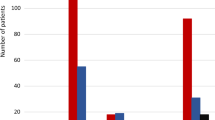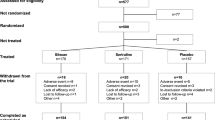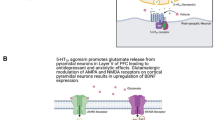Abstract
Recent high-quality studies have confirmed the central role of lithium in the treatment of bipolar disorder and have established lithium as the drug of first choice for long-term prophylaxis in this condition. However, several indications for its use in unipolar major depression are also based on sound evidence. This includes lithium augmentation as a main strategy for depressed patients not responding to an antidepressant, lithium prophylaxis for recurrent unipolar depression as an alternative to prophylaxis with an antidepressant, and lithium’s unique anti-suicidal properties. Lithium monotherapy, on the other hand, is not established for acute treatment of depression. Lithium therapy should be a core competency of every psychiatrist, enabling the safe use of lithium, to the benefit of our patients.

Similar content being viewed by others
References
Lange C. Om periodiske Depressionstilstande og deres Patogenese. Kjøbenhavn: Jacob Lunds Forlag; 1886.
Cade JF. Lithium salts in the treatment of psychotic excitement. Med J Aust. 1949;2(10):349–52.
Baastrup PC, Schou M. Lithium as a prophylactic agents. Its effect against recurrent depressions and manic-depressive psychosis. Arch Gen Psychiatry. 1967;16(2):162–72.
Schou M. Normothymotics, “Mood-Normalizers”: are lithium and the imipramine drugs specific for affective disorders? Br J Psychiatry. 1963;109:803–9.
Baastrup PC, Poulsen JC, Schou M, Thomsen K, Amdisen A. Prophylactic lithium: double blind discontinuation in manic-depressive and recurrent-depressive disorders. Lancet. 1970;2(7668):326–30.
Pfennig A, Bschor T, Falkai P, Bauer M. The diagnosis and treatment of bipolar disorder: recommendations from the current S3 Guideline. Dtsch Arztebl Int. 2013;110(6):92–100.
Licht RW. Lithium: still a major option in the management of bipolar disorder. CNS Neurosci Ther. 2012;18(3):219–26.
Müller-Oerlinghausen B, Berghöfer A, Bauer M. Bipolar disorder. Lancet. 2002;359(9302):241–7.
Geddes JR, Miklowitz DJ. Treatment of bipolar disorder. Lancet. 2013;381(9878):1672–82.
Cipriani A, Barbui C, Salanti G, Rendell J, Brown R, Stockton S, et al. Comparative efficacy and acceptability of antimanic drugs in acute mania: a multiple-treatments meta-analysis. Lancet. 2011;378(9799):1306–15.
Burgess S, Geddes J, Hawton K, Townsend E, Jamison K, Goodwin G. Lithium for maintenance treatment of mood disorders. Cochrane Database Syst Rev. 2001;(2):CD003013.
Cipriani A, Smith K, Burgess S, Carney S, Goodwin G, Geddes J. Lithium versus antidepressants in the long-term treatment of unipolar affective disorder. Cochrane Database Syst Rev. 2006;(4):CD003492.
Baethge C, Gruschka P, Smolka MN, Berghofer A, Bschor T, Muller-Oerlinghausen B, et al. Effectiveness and outcome predictors of long-term lithium prophylaxis in unipolar major depressive disorder. J Psychiatry Neurosci. 2003;28(5):355–61.
DGPPN, BÄK, KBV, AWMF, AkdÄ, BPtK, BApK, DAGSHG, DEGAM, DGPM, DGPs, DGRW (eds.) for the Guideline Group Unipolar Depression*. S3-Guideline/National Disease Management Guideline Unipolar Depression. Short Version. 2009. DGPPN, ÄZQ, AWMF - Berlin, Düsseldorf 2009. http://www.dgppn.de, http://www.versorgungsleitlinien.de, http://www.awmf-leitlinien.de.
Bauer M, Bschor T, Pfennig A, Whybrow PC, Angst J, Versiani M, et al. World Federation of Societies of Biological Psychiatry (WFSBP) guidelines for biological treatment of unipolar depressive disorders in primary care. World J Biol Psychiatry. 2007;8(2):67–104.
NICE—National Collaborating Centre for Mental Health NIoCE. Depression. The treatment and management of depression in adults NICE clinical guideline; 2009.
Adli M, Bschor T, Canata B, Döpfmer S, Bauer M. Lithium in the treatment of acute depression. Fortschr Neurol Psychiatr. 1998;66(10):435–41.
Arieli A, Lepkifker E. The antidepressant effect of lithium. Curr Dev Psychopharmacol. 1981;6:165–90.
Khan MC, Wickham EA, Reed JV. Lithium versus placebo in acute depression: a clinical trial. Int Clin Psychopharmacol. 1987;2(1):47–54.
Bschor T, Uhr M, Baethge C, Lewitzka U, Ising M, Erbe S, et al. Acute antidepressive efficacy of lithium monotherapy, not citalopram, depends on recurrent course of depression. J Clin Psychopharmacol. 2013;33(1):38–44.
Köhler S, Gaus S, Bschor T. The challenge of treatment in bipolar depression: evidence from clinical guidelines, treatment recommendations and complex treatment situations. Pharmacopsychiatry. 2014;47(2):53–9.
Bschor T. Therapy-resistant depression. Expert Rev Neurother. 2010;10(1):77–86.
De Montigny C, Grunberg F, Mayer A, Deschenes JP. Lithium induces rapid relief of depression in tricyclic antidepressant drug non-responders. Br J Psychiatry. 1981;138:252–6.
Bschor T, Bauer M. Efficacy and mechanisms of action of lithium augmentation in refractory major depression. Curr Pharm Des. 2006;12(23):2985–92.
Bauer M, Crossley NA, Gerber S, Bschor T. The acute antidepressive effects of lithium: from monotherapy to augmentation therapy in major depression. In: Bauer M, Grof P, Müller-Oerlinghausen B, editors. Lithium in neuropsychiatry. The comprehensive guide. London: Informa Healthcare; 2006. p. 109–27.
Crossley NA, Bauer M. Acceleration and augmentation of antidepressants with lithium for depressive disorders: two meta-analyses of randomized, placebo-controlled trials. J Clin Psychiatry. 2007;68(6):935–40.
Baumann P, Nil R, Souche A, Montaldi S, Baettig D, Lambert S, et al. A double-blind, placebo-controlled study of citalopram with and without lithium in the treatment of therapy-resistant depressive patients: a clinical, pharmacokinetic, and pharmacogenetic investigation. J Clin Psychopharmacol. 1996;16(4):307–14.
Katona CL, Abou-Saleh MT, Harrison DA, Nairac BA, Edwards DR, Lock T, et al. Placebo-controlled trial of lithium augmentation of fluoxetine and lofepramine. Br J Psychiatry. 1995;166(1):80–6.
Bauer M, Döpfmer S. Lithium augmentation in treatment-resistant depression: meta-analysis of placebo-controlled studies. J Clin Psychopharmacol. 1999;19(5):427–34.
Bauer M, Bschor T, Kunz D, Berghöfer A, Ströhle A, Müller-Oerlinghausen B. Double-blind, placebo-controlled trial of the use of lithium to augment antidepressant medication in continuation treatment of unipolar major depression. Am J Psychiatry. 2000;157(9):1429–35.
Bschor T, Berghöfer A, Ströhle A, Kunz D, Adli M, Müller-Oerlinghausen B, et al. How long should the lithium augmentation strategy be maintained? A 1-year follow-up of a placebo-controlled study in unipolar refractory major depression. J Clin Psychopharmacol. 2002;22(4):427–30.
APA. Practice guideline for the treatment of patients with major depressive disorder. 3rd ed. Arlington (VA): APA; 2010. http://psychiatryonline.org/pdfaccess.ashx?ResourceID=243261&PDFSource=6.
Köhler S, Unger T, Hoffmann S, Steinacher B, Fydrich T, Bschor T. Comparing augmentation with non-antidepressants over sticking to antidepressants after treatment failure in depression: a naturalistic study. Pharmacopsychiatry. 2013;46(2):69–76.
Adli M, Baethge C, Heinz A, Langlitz N, Bauer M. Is dose escalation of antidepressants a rational strategy after a medium-dose treatment has failed? A systematic review. Eur Arch Psychiatry Clin Neurosci. 2005;255(6):387–400.
Bschor T, Baethge C. No evidence for switching the antidepressant: systematic review and meta-analysis of RCTs of a common therapeutic strategy. Acta Psychiatr Scand. 2010;121(3):174–9.
Hawton K, Casanas ICC, Haw C, Saunders K. Risk factors for suicide in individuals with depression: a systematic review. J Affect Disord. 2013;147(1–3):17–28.
Tondo L, Hennen J, Baldessarini RJ. Lower suicide risk with long-term lithium treatment in major affective illness: a meta-analysis. Acta Psychiatr Scand. 2001;104(3):163–72.
Baldessarini RJ, Tondo L, Hennen J. Lithium treatment and suicide risk in major affective disorders: update and new findings. J Clin Psychiatry. 2003;64(Suppl 5):44–52.
Guzzetta F, Tondo L, Centorrino F, Baldessarini RJ. Lithium treatment reduces suicide risk in recurrent major depressive disorder. J Clin Psychiatry. 2007;68(3):380–3.
Cipriani A, Hawton K, Stockton S, Geddes JR. Lithium in the prevention of suicide in mood disorders: updated systematic review and meta-analysis. BMJ. 2013;346:f3646.
Lauterbach E, Felber W, Müller-Oerlinghausen B, Ahrens B, Bronisch T, Meyer T, et al. Adjunctive lithium treatment in the prevention of suicidal behaviour in depressive disorders: a randomised, placebo-controlled, 1-year trial. Acta Psychiatr Scand. 2008;118(6):469–79.
Khan A, Khan S, Kolts R, Brown WA. Suicide rates in clinical trials of SSRIs, other antidepressants, and placebo: analysis of FDA reports. Am J Psychiatry. 2003;160(4):790–2.
Khan A, Khan SR, Leventhal RM, Brown WA. Symptom reduction and suicide risk in patients treated with placebo in antidepressant clinical trials: a replication analysis of the Food and Drug Administration Database. Int J Neuropsychopharmacol. 2001;4(2):113–8.
Khan A, Warner HA, Brown WA. Symptom reduction and suicide risk in patients treated with placebo in antidepressant clinical trials: an analysis of the Food and Drug Administration database. Arch Gen Psychiatry. 2000;57(4):311–7.
Gunnell D, Saperia J, Ashby D. Selective serotonin reuptake inhibitors (SSRIs) and suicide in adults: meta-analysis of drug company data from placebo controlled, randomised controlled trials submitted to the MHRA’s safety review. BMJ. 2005;330(7488):385.
Hammad TA, Laughren TP, Racoosin JA. Suicide rates in short-term randomized controlled trials of newer antidepressants. J Clin Psychopharmacol. 2006;26(2):203–7.
Fergusson D, Doucette S, Glass KC, Shapiro S, Healy D, Hebert P, et al. Association between suicide attempts and selective serotonin reuptake inhibitors: systematic review of randomised controlled trials. BMJ. 2005;330(7488):396.
Storosum JG, van Zwieten BJ, van den Brink W, Gersons BP, Broekmans AW. Suicide risk in placebo-controlled studies of major depression. Am J Psychiatry. 2001;158(8):1271–5.
Goodwin FK, Fireman B, Simon GE, Hunkeler EM, Lee J, Revicki D. Suicide risk in bipolar disorder during treatment with lithium and divalproex. JAMA. 2003;290(11):1467–73.
Can A, Schulze TG, Gould TD. Molecular actions and clinical pharmacogenetics of lithium therapy. Pharmacol Biochem Behav. doi:10.1016/j.pbb.2014.02.004.
Rybakowski JK. Genetic influences on response to mood stabilizers in bipolar disorder: current status of knowledge. CNS Drugs. 2013;27(3):165–73.
Malhi GS, Tanious M, Das P, Coulston CM, Berk M. Potential mechanisms of action of lithium in bipolar disorder. Current understanding. CNS Drugs. 2013;27(2):135–53.
Berghöfer A, Grof P, Müller-Oerlinghausen B. Recommendations for the safe use of lithium. In: Bauer M, Grof P, Müller-Oerlinghausen B, editors. Lithium in neuropsychiatry. The comprehensive guide. London: Informa healthcare; 2006. p. 443–64.
McKnight RF, Adida M, Budge K, Stockton S, Goodwin GM, Geddes JR. Lithium toxicity profile: a systematic review and meta-analysis. Lancet. 2013;379(9817):721–8.
Acknowledgments
TB is a secretary of the International Group for the Study of Lithium Treated Patients (IGSLI). Over the past 3 years, TB has received speaker’s honoraria from Lilly, AstraZeneca, Esparma, Bristol-Myers Squibb, Sanofi-Aventis, Servier, and Lundbeck, and has accepted reimbursement of travel expenses to congresses from AstraZeneca and Lundbeck. No sources of funding were used to assist with the preparation of this review.
Author information
Authors and Affiliations
Corresponding author
Rights and permissions
About this article
Cite this article
Bschor, T. Lithium in the Treatment of Major Depressive Disorder. Drugs 74, 855–862 (2014). https://doi.org/10.1007/s40265-014-0220-x
Published:
Issue Date:
DOI: https://doi.org/10.1007/s40265-014-0220-x




